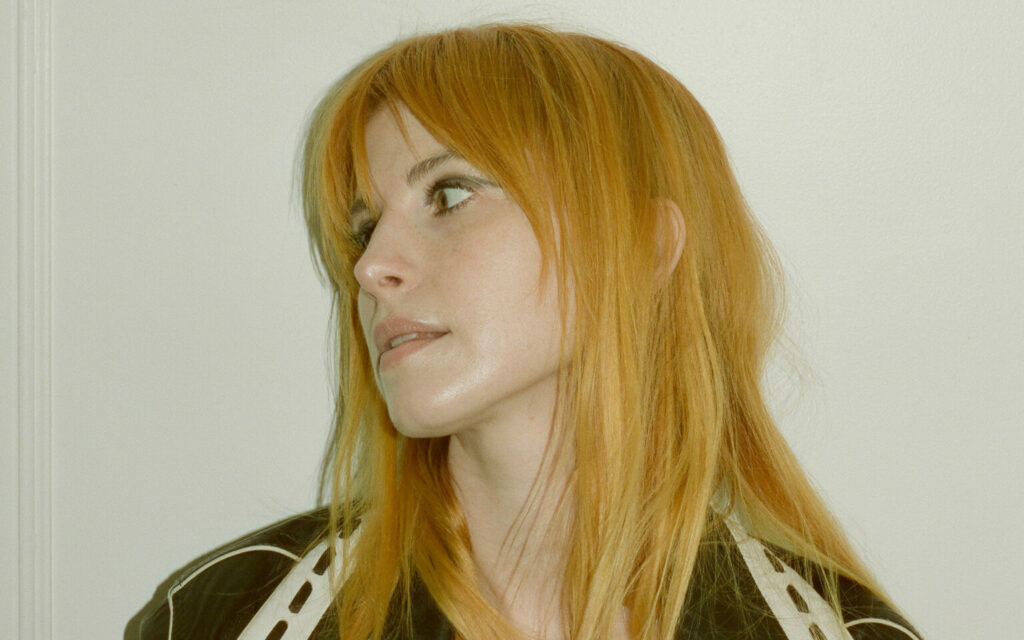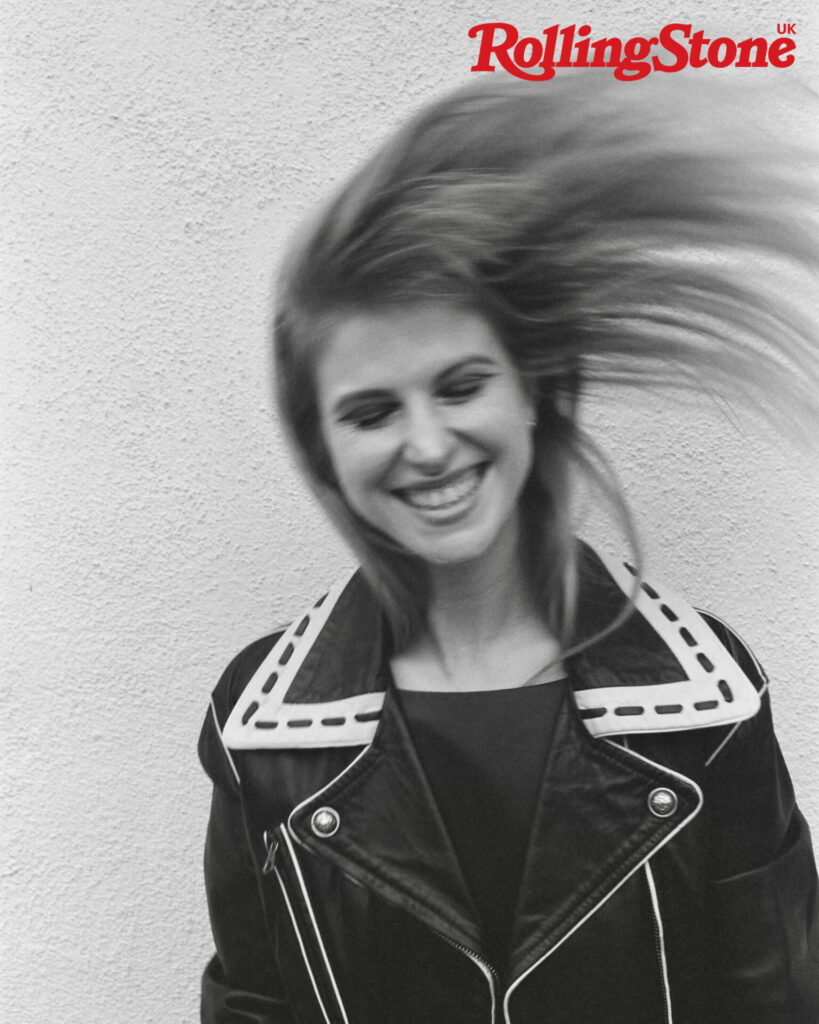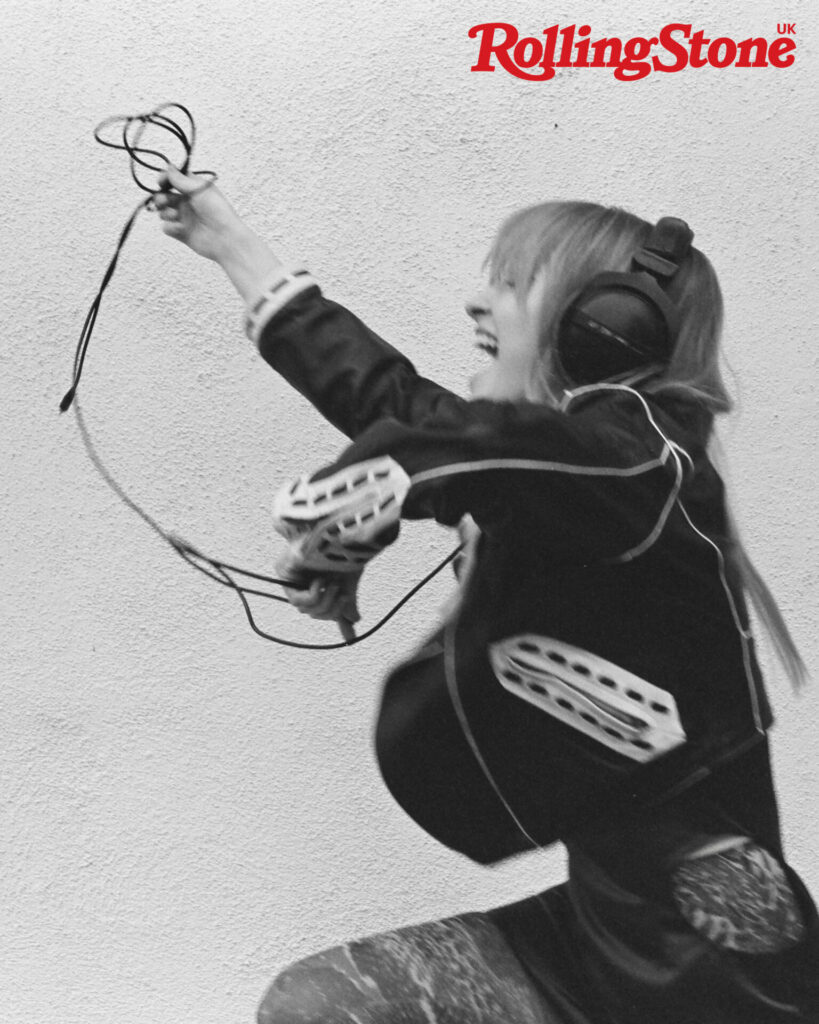Hayley Williams on her new podcast, Everything is Emo
The Paramore frontwoman has created a new BBC Sounds podcast series about the rock subgenre. She tells us what emo means to her, why Twilight is camp and why teens are being pulled towards extreme emotional music again today.
By Hannah Ewens

Emo is a confused and contentious term. No one has ever been able to pin down concisely what it means, and that’s largely down to the strong aversion to the word from the bands attached to the scene. One of these artists is the beloved alternative act Paramore. Frontwoman Hayley Williams is an interesting and ideal choice, then, to host a celebratory podcast about the rock subgenre.
BBC Sounds (who are releasing the podcast today) approached Williams with the pitch – the idea could not have come from her. “For so long I’ve been adamant about not being pigeonholed into one scene that it would have never come from my brain,” she tells Rolling Stone UK. “But I’m so glad that someone came to me about it, because it’s given me a cool opportunity to be nerdy about music and reminisce but also inject discovery for people that musically haven’t discovered these amazing new bands that are coming from a long lineage of great music.”
The result is an expansive and authoritative show that will surprise even the most expert of fans – naturally Williams knows the deep cuts of the genre that informed her taste. But it feels inclusive where rock-related sources of information frequently fail to be. With Williams’ warm hosting and personal stories about how she found the music, as a listener you aren’t left with the feeling that you should know of these artists or possess more information about them if you were a real emo fan.
Each episode features around a dozen songs and includes tracks that are only tangentially related to emo or its various eras over the past few decades. Sometimes these are simply new pop and rock songs that couldn’t have existed without emo artists.
Here Rolling Stone UK speaks to Williams about the making of the Everything is Emo podcast, previous attempts to define the subgenre and why the Twilight films are both emo canon and extremely camp.
I love the title – I think all the time about how everything is emo: sad pop music or an animal showing human emotion or Phoebe Bridgers. Is that something you consider sometimes too?
Oh my God, yeah. Since day one, I was perplexed when I first heard about this word ‘emo’. I searched it on the internet and tried to understand because I was getting into music that wasn’t popular on the radio. I was discovering this whole other world and I wanted to understand it better because I wanted to know everything, I wanted to really be in. And emo has changed so much throughout the years. But one thing that’s never changed from day one: people are confused about what the fuck emo is.
One of the articles that I pulled up back then, when I was 13, had Ian MacKaye from Minor Threat and Fugazi being like ‘that’s so stupid, everything’s emo’. ‘Punk music is emo because people are expressing their rage or their frustration’ or whatever. And I’ve watched it evolve throughout the years, like you’re saying, one minute emo sounds like pop punk and then the next minute emo sounds like Phoebe Bridgers and Conor Oberst doing a project together. Where we’ve gotten to now people are much more open to a lot of different versions of the word and I think that’s cool.
It’s this quality that’s not really to do with the sound but is closer to a specific type of emoting. You often know if something’s emo and if it’s not, you just don’t know like why exactly.
That’s so true. It’s an unspoken felt thing.
“You have to look at our scene and our world and our music with a touch of humour. And camp as well”
– Hayley Williams
When Paramore was on the rise, I’d read rock music magazines and they’d often have bands in there, including yourselves, saying ‘we’re not emo, emo sucks’. What were your thoughts about that distancing that was going on?
Oh, man, we were so concerned – especially me – with not being whatever the scene deemed as poser or whatever. Especially as a young girl, the pressure was really on to not be lame. It was like, ‘Well, I have to prove myself 50 per cent harder than these guys’ and I have to not show certain vulnerabilities or I have to thrash harder on stage, I have to write better lyrics. Back in 2004, Kelly Clarkson had a really huge album [Breakaway] that was guitar-driven. I remember back then being like, ‘oh, people are gonna compare us to Kelly Clarkson’ because we have guitars and female vocal, you know? It wasn’t even really competitive, I was just trying to prove myself all the time.
Definitely more than once said we were not emo in interviews. We also were like, we’re not pop punk. In interviews, I think we just didn’t want to be anything specific. Because we always wanted to be able to transcend whatever that was. When we started playing Warped Tour, in the back of my mind, I was like, I want to be the best band on this tour and then I want to graduate and then I want to be able to take on whatever next world that we’re going to take on. But obviously we came out, and [emo] is just the world we fit into. And a lot of it we resented at the time, but now I’m like, whatever, just call us whatever you want, we’re just gonna do what we want to do anyways.
Emo made punk music more accessible, and then it became more and more popular to the point bands like us were on MTV, and now we’re playing on the radio, and now you’ve got this generation’s version of that all over the place.
It’s so interesting to me that people just make emo whatever they want it to be. If they want Phoebe Bridgers to be emo or underground then that’s what it is. And if they want Paramore to be pop punk or emo, it just is up to the people. It’s never up to the bands. It’s up to journalists and how people categorise shit. And I feel like the difference now is this generation doesn’t seem to care as much about the compartmentalisation. There’s not inhibitions about ‘oh, I don’t want to be a poser if I listen to this’.

When I was a teenager in the UK, Paramore and MCR weren’t the most popular emo bands but through the lens of nostalgia, that’s how we remember it. To my memory, it was mainly me and like the other emo girls just being all in on Paramore.
100 per cent. I would say most popular waves of music are driven by young teenage girls. I’m just happy that there’s not really the same type of gatekeeping that there was. I think it takes too much energy to be a gatekeeper of this scene. That’s one thing that with the show I’m trying to make clear is that there’s no sense in blocking certain people out of it. I might even play a couple songs that intentionally are not emo songs. There’s certain music and movies and characters and pop culture that our scene just really was embracing of. And I want to remember that energy where as music lovers, we should just be stoked on cool shit and doesn’t mean you have to like everything.
When I plan these playlists I’m trying to keep that in mind: like don’t gatekeep this scene because you don’t want to become one of those crotchety old fucking dinosaurs that’s like, ‘that’s not punk’ and ‘that’s not emo’. I definitely have that voice in me, don’t get me wrong, that’s a fatal flaw maybe. But I work on it and I keep it in check.
“I would say most popular waves of music are driven by young teenage girls. I’m just happy that there’s not really the same type of gatekeeping that there was. I think it takes too much energy to be a gatekeeper of this scene”
— Hayley Williams
On that note, I loved that you played music from the Twilight soundtrack in the first episode. That film franchise felt like next gen emo canon somehow? Teenagers just after us and teenagers now just love it.
You have to look at our scene and our world and our music with a touch of humour. And camp as well. Twilight was peak camp, to me. And I don’t know that it was intended to be that but I think I can look back on it and be like, look at the makeup in this movie, look at the glowing complexion of these people that are so pale they’re see through. Obviously they’re vampires but it also very much exemplifies what a lot of guys in the scene looked like at that time.
I definitely struggled when we did that that soundtrack. There was part of me that read the books, I loved them, they were easy reads and they were fun. It was: holy shit, we have a song in a movie – that was crazy. And then the resentment set in like, ‘oh my god, we’re the Twilight band’. It took a long time to get over that part of myself that wanted to be like ‘you’re a poser’. I just kind of had to be like, ‘no fuck it, Radiohead’s on that’. That’s crazy. Bon Iver’s on it. And let’s not pretend like Twilight didn’t catapult our band into a different route. We were not as well known before that soundtrack came out. It opened us up to a slew of fans that probably wouldn’t have given us a chance before that or didn’t know we existed before. I look back on it now like that’s crazy. Kristen Stewart is Princess Diana now and Robert Pattinson is the Batman. And we’re still a band so everyone’s doing fine.

You say on the pod that Paramore – ‘I Caught Myself’ is one of your favourite Paramore songs. Is that partly because of it being on that soundtrack, along with ‘Decode’?
Those songs are really special to us. When Zac [Farro] re-joined the band after being away for like six or seven years, we played a local show in Nashville that was kind of a surprise. And we told him, ‘you pick some songs that you really have missed playing because this is your first show back in a long time’. And he was like, ‘I really want to play ‘Decode’, I always loved playing drums on that because I just get to beat the drums up’. Both of those songs we wrote at soundcheck during one of the Riot tours. They really, to me, mean so much to our story as a band – they came at this awful time when we weren’t getting along and I think of that more than I think of like, ‘Oh, what was it like to go to the [Twilight] premiere?’ We were really lucky that as much as our lives kind of were falling apart personally, we were getting to do all these crazy amazing things that people dream their whole life of doing. I love that they’re in a movie – they’re not on a Paramore album but they have a home. It reminds me of like when I bought the Batman Forever soundtrack as a kid, and it had Seal and all these other artists on it, and it was very dramatic and dark. Like, we’re on one of those soundtracks. That’s ridiculous. That’s so stupid. And I love it. So, I had to include it.
“People are confused about what the fuck emo is”
– Hayley Williams
When you sat down to plan this podcast, how did you go through this subgenre and decide what goes in and stays out?
I agonise over every playlist, even if I’m just making a playlist for my sister. I’ve made a mixtape before in my life which I don’t know how many people my age have. I put so much pressure on myself to make playlists feel like there’s an emotional arc. But the most fun thing to me about making these playlists was rediscovering songs because not all these songs are my favourite songs in the world. I’m trying to do justice to the time that these songs came out, the scene that they came out of. Then I’m also trying to like new shit for people to discover new bands like Wet Leg and Fontaines D.C., who are probably a lot bigger overseas than they are here, but people have to know about this band. Where would they be if all these other bands and these punk scenes and different subgenres didn’t exist first, you know?
In our recent cover story with Bring Me the Horizon, Oli Sykes said that extreme emotion disappeared in music for 10 years, and kids are rediscovering that level of it now. What do you think about that? Why do you think kids might be gravitating towards emo after such a long decade of that not really being popular or cool?
Ooh, that’s a big question. What’s popular is just like a constant pendulum swinging from all the way this way to that way. And I see that in everything. Politics, music, fashion: we’re always going from one extreme to the next extreme without even having regard for the grey in between. I do think we were in a grey area and I don’t think that that’s bad.
I think so much good shit came out in the last 10 years, right, and a lot of really emotional shit too. I think about songs that I’ve written in the last 10 years that I would have never written 15, 20 years ago, that just explored more nuanced feelings and not quite as extreme. It gave me a way to just get to know my feelings better. Because I had that issue where I was like, everything has to be angry, I’m just angry all the time. And I’m still angry. I’m an adult woman and I still have plenty of rage in me. But there were things for me that I needed to explore that weren’t solely anger, or solely heartbreak, or solely loss or grief. There’s all that messy in-between too.
But look at the world – the world’s so fucked and I can’t imagine being a teenager right now. I can’t imagine growing up in a world where from the day you were born, there’s been cameras in your face, and you’re on social media, and you don’t even know what’s out there but you’re out there with your image and your you have access to all this information and some of it’s really damaging. But on the flip side, young people are really very well aware of things that when I was 15, we didn’t know existed. We weren’t having deep conversations about identity politics, we weren’t having deep conversations about the climate crisis. Those kinds of things are a lot of pressure and it’s beautiful that kids care. And I think they need a place to put the frustration and they need a place to put all those extreme feelings that probably their brains can’t even fully fathom yet. You can’t expect a teenager or a young kid to be able to rationalise all those things. They shouldn’t have to but it’s the world we live in.
Everything is Emo with Hayley Williams is available on Back to Back Sounds: Amplified on BBC Sounds.
